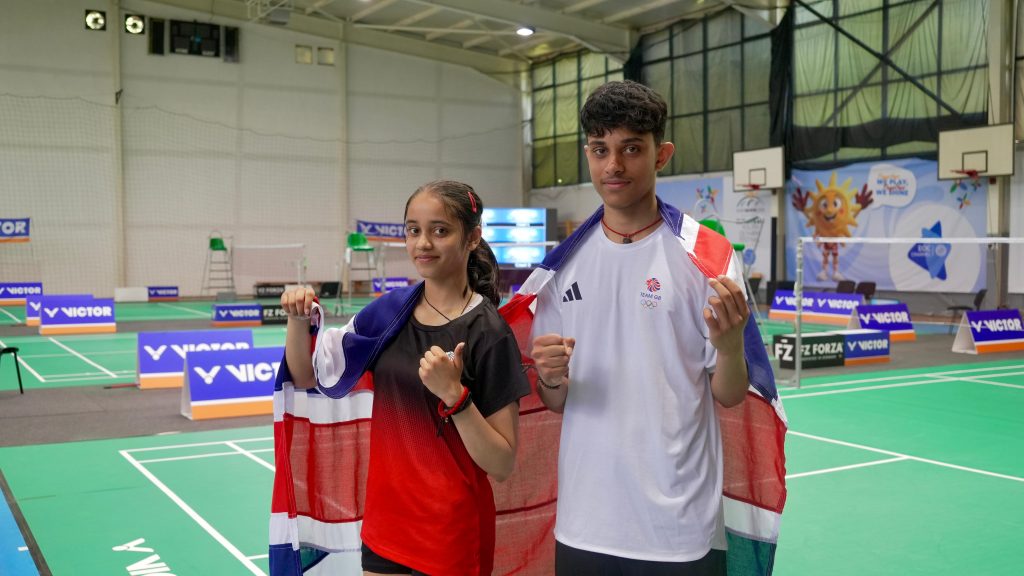British badminton rediscovered its sparkle this summer thanks to two teenage prodigies. Ishasriya Mekala and Kalyan Manoj etched their names into history at the 2025 European Youth Olympic Festival (EYOF), each claiming gold in the singles events and delivering an unprecedented double for the United Kingdom. It was also the country’s first badminton medals at the EYOF since 1999 – a landmark moment which may well signal the beginning of a new chapter for a sport still seeking greater recognition in the very country where it was invented.

Manoj and Mekala: British triumphs
In Skopje, Manoj put together an impressive campaign to lift the boys’ singles crown. After sweeping through his opening matches, he was pushed to the limit in the quarter-finals by Lithuania’s Daniel Leonovic, eventually coming through in three games (21-8, 20-22, 21-17) in what proved to be his toughest test of the week. In the final, he faced Switzerland’s Santiago Araujo – the very opponent who had beaten him a year earlier. This time Manoj left no doubt, dispatching him 21-16, 21-10. “I beat him in the group stage and then again in the final, which shows the progress I’ve made,” he said after sealing gold.
For Manoj, the victory carried a special resonance. “When I realised I was about to win the gold medal, I enjoyed every point,” he reflected. Already part of the set-up at the National Badminton Centre in Milton Keynes, he is benefiting from top-level coaching and the chance to train alongside established players. George Bevan, head of the performance programme, was effusive in his praise: “He has fully committed himself and is already adapting to the demands of a senior environment. This gold medal is the reward for his dedication.”
Mekala’s route to the same result was no less impressive. Facing Denmark’s Diya Mary Cherian in the girls’ singles final, she produced what she herself described as “one of [her] best performances to date.” Combining tactical intelligence with consistency under pressure, she secured gold and ensured Britain completed a historic double.
“I’ve worked so hard to get here, so knowing it paid off is an amazing feeling,” Mekala said afterwards. Quick to highlight the role of those around her, she added: “Everyone was cheering me on, and seeing Kalyan and I both win shows this is just the beginning for British badminton.”
Later in the week, Mekala and Manoj teamed up for the mixed doubles, but understandably struggled to match their singles form, bowing out in the opening round. It did little to dampen their spirits. The key statement had already been made: individually, both had proved they belong on the international stage.
A powerful statement for the future of British badminton
The double gold in Skopje was more than just two medals; it was a declaration that the United Kingdom can once again produce players capable of challenging the continental elite. For more than two decades, British badminton had struggled for relevance in Europe, where Denmark has long held sway and Asian nations continue to dominate globally. By breaking that pattern, Mekala and Manoj have opened up a window of hope.
Their success also reflects the growing effectiveness of the national development system. The structures now in place – most notably the work at Milton Keynes – are providing a framework for teenagers to compete internationally at an earlier age than ever before. The challenge ahead will be to navigate the notoriously difficult transition into senior competition, where the pace is quicker, the margins finer and the physical and mental demands far greater.
Yet the promise is undeniable. British badminton has waited a generation for players to deliver such a breakthrough on the European stage, and the manner in which two youngsters, aged just 15 and 16, rose to the occasion has not gone unnoticed. It was not simply the medals, but the composure, maturity and hunger both displayed throughout the week that have caught the eye.
The history books will record that in the summer of 2025, Britain rediscovered the taste of gold in badminton thanks to Ishasriya Mekala and Kalyan Manoj. The road to senior success will inevitably bring setbacks and challenges, but one thing already seems certain: British badminton has found its new faces, and perhaps even the foundation of a generation that can finally dream of competing with the world’s very best.
